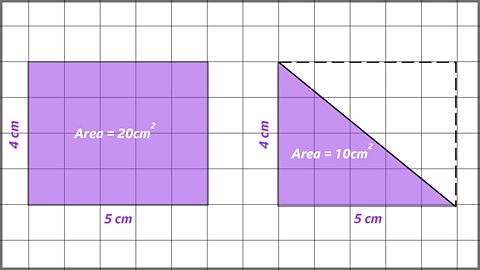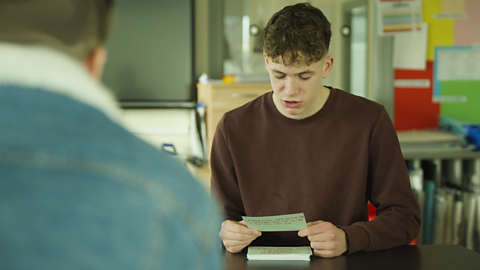This article was first published in April 2025.
GCSE revision season is well underway, and as it gets nearer to the start of your maths exams you might be feeling all kinds of emotions, but try not to get too stressed!
Our brand new Bitesize maths revision guides make it easy to dip into topics that you might be finding challenging or want a refresh on, and if you want some some handy tips, tricks and techniques to help make your maths revisions sessions a little more productive and get you on the road to pass your maths exams, then scroll down to read our guide.

Tip one: Practise, practise, practise!
The best way to revise maths is to DO maths. Don’t just read through your notes aimlessly – dive in and do some questions! We recommend breaking your maths study sessions up into smaller chunks; 15-20 minutes of maths revision every day is much better than two hours once a week. Bear this in mind when you are planning your revision timetable.
A great way to spend a 20 minute revision session is to complete the maths quizzes and quick fire questions on Bitesize. Our new revision guides have loads of great videos, slideshows, explanations, exam-style questions and activities to help you understand maths topics.


Tip two: Level up your flashcards!
Practising lots of questions on one topic is great for getting confident with a skill, but when topics are all mixed up in an exam, you need to be able to tell the difference between the different command words. For example, an algebra question might ask you to:
- Simplify – make the expression look simpler, maybe by collecting terms together.
- Solve – find the missing letter, usually by doing the same thing to both sides of the equation.
- Expand – remove the brackets.
- Factorise – put into a bracket or brackets.
We suggest making some flashcards with these types of key word on the front, and then a short explanation, or example, on the back. When you’re in the exam and see that key word in a question, your brain will then connect the key word with the explanation, and you’re on your way!
Use your flashcards to test yourself in the run up to the exam. Don't just read the flashcard, try and recall the answers – this is known as retrieval practice and will help you remember the information.
Keep your flashcards organised by bundling them into 6 main categories: Number, Ratio and Proportion, Algebra, Geometry and Measures, Probability, and Statistics.
Tip three: Get to grips with the right equipment
It's important to know how to use all of the equipment you'll need in your exam. That means ditching your phone calculator when revising in favour of the scientific calculator you'll actually use in the exam. It's really important that you're familiar with the buttons on the calculator for those calculator papers. Using your calculator should feel effortless, letting you concentrate on what the question is really asking.
Preparation is key, so make sure that you've got everything you need before you start revising, that means having a pair of compasses and protractor ready to go. Don’t skip questions on practice papers that you need to use specific equipment for just because they’re in a different room! If you don't have tracing paper to hand, then you could use baking paper or even a polythene wallet. If you are unsure what kind of equipment you will need for your exams, make sure you check with your teacher in advance.


Tip four: Learn the 'why' behind the formula
Knowing why a formula works is more useful than trying to memorise lots of formulae, and it’s better for your understanding too.
Let's take a look at the area of a triangle as an example.
Area is the space inside a shape. If you fill the rectangle with squares of length 1 cm, the rectangle takes up 20 square centimetres. A quick way to count the squares is to calculate 5 × 4, or base × height.
The triangle takes up half the space of the rectangle. That's why the area of a triangle is ½(base × height). But instead of remembering this formula for the area of a triangle, you might find it easier to remember the area of a triangle is half the area of a rectangle. Simple, right?
You can apply this approach to lots of other formulae. Real understanding sticks longer than trying to learn a long list of facts.

Tip five: Boss your past papers
You can use the following tips when using past papers, but remember, some of these tips also work on your actual exam paper too – so keep them in your mind for exam day!
- Break it up – This one is similar to our very first tip, you don’t have to do a full 90 minute past paper each time you revise – do it in three stages. Instead of splitting the paper into three chunks from start to end, do every third question so you get a range of difficulty level. Aim for roughly ‘a minute per mark’ but timing isn’t a priority to begin with – it will take longer at revision stage.
- Know your board – Make sure you’re using past papers or practice papers from your specific exam board, as you will then get used to the style of the questions they ask. Ask your teacher if you don’t know which exam board you’re doing.
- Exam conditions – When revising, follow the arrangements you would have in the exam where possible – for example, if you use a screen reader, use it when you do a past paper.
- Underline key words – Underline the key words and numbers, especially in worded questions.
- Find your weaknesses – Once you’ve done a past paper, write down the topics you struggled with, and revise/practise/ask for help on them. Don’t just go over the topics you do know, however tempting it is.
There are also loads more tips from Bitesize Study Support about revision and guides to help you during your exams – why not check them out?

If you need support
You should always tell someone about the things you’re worried about. You can tell a friend, parent, guardian, teacher, or another trusted adult. If you're struggling with your mental health, going to your GP can be a good place to start to find help. Your GP can let you know what support is available to you, suggest different types of treatment and offer regular check-ups to see how you’re doing.
If you’re in need of in-the-moment support you can contact Childline, where you can speak to a counsellor. Their lines are open 24 hours a day, 7 days a week.
There are more links to helpful organisations on BBC Action Line.

Revision: How to stay motivated
Just how do you stay motivated whilst revising?

How do I get started with revision?
How to get started with your revision.

Revision: How to get organised
Advice on how to get organised with your revision.
